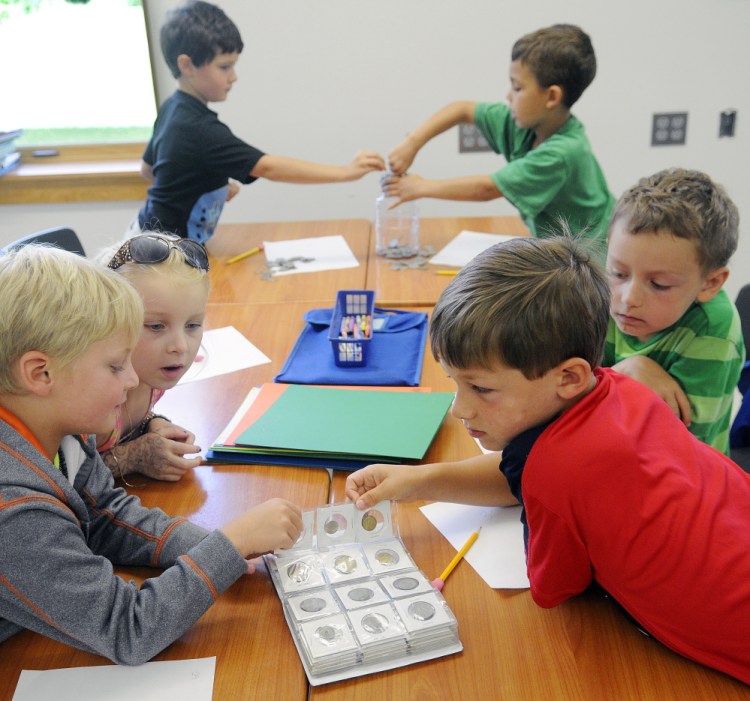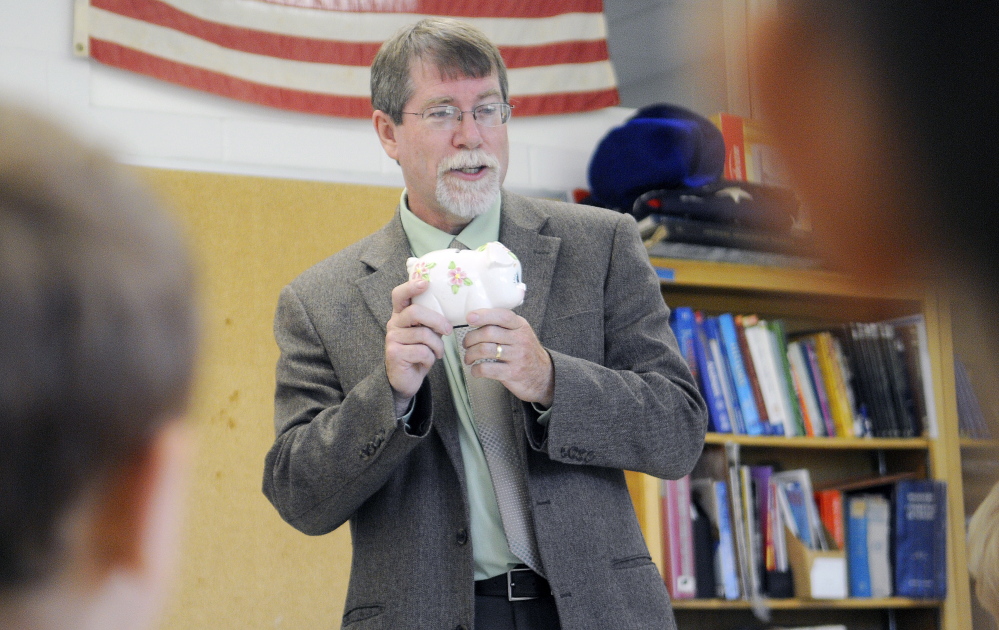AUGUSTA — Like many his age, Cody Gagnon still might be mastering his numbers, but the second-grader does have one thing about them down pat already.
When it comes to money, the bigger the number, the better.
Asked by guest speaker Steve Parker what he wants to be when he grows up, the youth had a quick and succinct answer.
“Rich,” he said.
Parker, a state assistant attorney general who recently spoke to students participating in Augusta Schools’ Title 1 Summer Camp, talked about mathematics and money to about 90 elementary school-age children taking part in the summer program.
He is one of several community members who volunteered as guest speakers to talk to children about the importance of literacy and mathematics in their present and future lives. He assured Cody and his young classmates they can indeed become rich one day, if they study and learn crucial skills while in school, and carefully manage and save their money.
“If you want to be rich, read, write and learn math,” said Parker, whose visual aids for his talk included a large pile of fake dollar bills. “If you do that, you can earn all these piles of money you want.”
He added, however, there are more important things in life than money, such as friendship and love.
“So be kind to each other, appreciate your friends and family, and do good things, and you will be rich, no matter how much money you make,” Parker said.
Other speakers have included radio personality Jon James, Cony High School athletic director Paul Vachon, and Capitol Police Officer Joe Morelli, who did a cooking demonstration for students to help show that reading and mathematics are used in everyday activities.
Theresa Violette, Title 1 director, said this is the first summer in which the program has had community members speak to students to help motivate them to learn in fun ways.
Fifteen to 20 high school students, including athletes, honor roll students and students who’ve been in the Title 1 program themselves, also have helped this summer. They’ve served as mentors by chatting, on their own time, with the younger students about the importance of learning to read, write and do mathematics.
Micheal Parker, literacy specialist at Farrington Elementary School, coordinator of the Title 1 Summer Camp, and Steve Parker’s wife, said the young students look up to their older peers and proudly show them what they are working on when the older students are around.
The adult community members’ presentations also help to keep students engaged, she said, adding to the reading and mathematics lessons shared by the program’s four classroom teachers, 10 tutors and three education technicians.
Micheal Parker said students in the five-week program meet Tuesdays, Wednesdays and Thursdays from 8:15 to 11:15 a.m. They are given breakfast and transportation is provided by bus. Students who participated in Title 1 programs in the city’s four elementary schools, as well as the private St. Michael School, may attend.
Title 1 is a federally funded program meant to help students achieve higher academic standards, providing remedial help to students identified as eligible through a screening process. Parents whose students are in Title 1 programs may, but are not required to, send their children to the Title 1 Summer Camp.
The classes are at Cony High School. Because Cony’s library is full of books for middle and high school students, not elementary school students, Lithgow Public Library has provided age- and reading-level-appropriate books for the summer literacy program at Cony.
Micheal Parker said a main goal of the summer program is to prevent “summer slide” — students forgetting what they learned in school the previous school year.
Officials tested students before the start of the summer program and will test them again at its conclusion, to measure its effectiveness.
While the “after” testing hasn’t taken place yet, Micheal Parker said there are signs the program has been successful. She said some students have not only not lost a reading level over the summer, they’ve gained a reading level over the summer.
Steve Parker used anecdotes from his own youth to teach students the importance of learning how to do mathematics and, in turn, use it to manage money.
He said he used it even as a boy, such as when he wanted a mini-bike, and figured out how long it would take him to earn enough money to buy one, by saving his allowance and mowing a neighbor’s lawn all summer.
He asked students how many knew how to count to 10, then counted to 10 with them, and pointed out that those first 10 digits make up every other number there is, so they’re already well on their way to learning mathematics.
Parker also explained the benefits of saving money, noting that when someone saves a dollar a day and puts it into an account where it draws interest, that dollar a day can grow to $365, plus $8 interest, in a year, about $4,000 and $170 in interest in 10 years, more than $21,000 and $811 in interest in 30 years, and more than $57,000 and $2,243 in interest in 50 years.
Keith Edwards — 621-5647
kedwards@centralmaine.com
Twitter: @kedwardskj
Send questions/comments to the editors.





Success. Please wait for the page to reload. If the page does not reload within 5 seconds, please refresh the page.
Enter your email and password to access comments.
Hi, to comment on stories you must . This profile is in addition to your subscription and website login.
Already have a commenting profile? .
Invalid username/password.
Please check your email to confirm and complete your registration.
Only subscribers are eligible to post comments. Please subscribe or login first for digital access. Here’s why.
Use the form below to reset your password. When you've submitted your account email, we will send an email with a reset code.